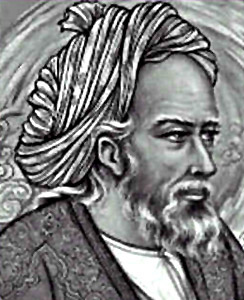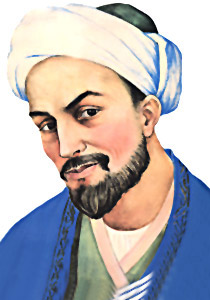The philosophy of Sufism is considered to be one of the most ancient philosophies in India. There have been numerous numbers of Sufi saints, who made their own contributions in spreading and popularising the philosophy in India and also all over the world. However, there are some authors; the Classical Sufi Authors, who are considered to be the most prominent ones among all the others. These Sufi authors have enriched the Sufi philosophy with their vast knowledge and also guided a large number of people all over the world for attaining the knowledge of Sufism. The classical Sufi authors include the likes of Mohamed El-Ghazali, Omar Khayyam, Farid ud-Din Attar, Mohiudin Ibn El-Arabi, Sheikh Saadi, Hakim Jami, Hakim Sanai, Jalaludin Rumi etc.
Mohamed El-Ghazali: Mohamed El-Ghazali was one of the prominent Sufi philosophers in the twelfth century. He wrote a number of books and followed the path of interpretation for spreading his message to the common men. "Book of Knowledge" is one of his most famous books, where he said, "To the sick man, sweet water tastes bitter in the mouth". This was actually the main motto of Ghazali`s philosophy and in fact, he pointed out and hammered home (often in engaging parables, sometimes in remarkably `modern` words) the problem of conditioning.
 Omar Khayyam: Omar Khayyam was a well known philosopher, scientist and practical instructors in Sufism and he lived between the years of 1048-1131. Khayyam was famous for his scientific achievements. He was born to Ghiyath al-Din Abul Fateh Omar Ibn Ibrahim al-Khayyam in Nishapur, the capital city of Khurasan. Omar Khayyam got his education at his native town and then studied under the celebrated teacher, the Iman Mowaffak. Omar Khayyam started to attain knowledge on Sufism, after completing his study and he soon became an ardent supporter of the philosophy of Sufism. He mainly followed the path of poetry to spread his message of Sufism and he used poetry, quite effectively.
Omar Khayyam: Omar Khayyam was a well known philosopher, scientist and practical instructors in Sufism and he lived between the years of 1048-1131. Khayyam was famous for his scientific achievements. He was born to Ghiyath al-Din Abul Fateh Omar Ibn Ibrahim al-Khayyam in Nishapur, the capital city of Khurasan. Omar Khayyam got his education at his native town and then studied under the celebrated teacher, the Iman Mowaffak. Omar Khayyam started to attain knowledge on Sufism, after completing his study and he soon became an ardent supporter of the philosophy of Sufism. He mainly followed the path of poetry to spread his message of Sufism and he used poetry, quite effectively.
Farid ud-Din Attar, Attar of Nishapur: Farid ud-Din Attar was a great classical Sufi author and literacy master in the twelfth century. He had a great influence upon his following Sufi authors like Jalaludin Rumi. Farid ud-Din Attar was born in Nishapur, located in the north-eastern side of Iran and the tentative timeline for Attar`s living is 1120-1220 CE. Farid ud-Din Attar is also popularly known as the Attar of Nishapur, for being born in that place. At a very young age, Attar started his search for philosophical enlightenment and he went on pilgrimage to the holy place of Mecca. He travelled extensively throughout the area, including the countries like Egypt, Damascus and India.
Mohiudin Ibn El-Arabi: Mohiudin Ibn el-Arabi was born in Medinat Mursiya (presently known as day Murcia) in Al-Andalus on July 28, 1165 CE. He lived a large part of his life in Sevilla, as his family moved to Sevilla when he was only eight years old. Ibn El-Arabi started writing one of his most famous works, named Al-Futuhat al-Makkiyya (The Meccan Illuminations), while living near Mecca for three years. He left Mecca in 1204 and went to Anatolia, along with Majd-al-Din Es`haq (Isaac). He finally went to Damascus in 1223 and settled there for living the last seventeen years of his life, before he died on November 10, 1240.
 Sheikh Saadi, Saadi of Shiraz: Muslih-ud-Din Mushrif ibn Abdullah or Sheikh Saadi was born in the place named Shiraz, in Iran. As he was a resident of Shiraz, he was popularly known as the Saadi of Shiraz. He born in the year of 1184, and there is some confusion about the exact year of Saadi`s death. Some of the scholars say that Saadi died in the year of 1283, while some others claim the year to be 1291. Saadi went to Baghdad at a very young age, for studying Arabic literature and Islamic sciences at Al-Nizamiyya of Baghdad. However, he did not stay there for a long period and he continuously travelled through the countries like Anatolia, Syria, Egypt, and Iraq, from time to time. He also travelled to India and Central Asia. Sheikh Saadi got instructions from the great Sufi masters like Gilani and Suhrawardi.
Sheikh Saadi, Saadi of Shiraz: Muslih-ud-Din Mushrif ibn Abdullah or Sheikh Saadi was born in the place named Shiraz, in Iran. As he was a resident of Shiraz, he was popularly known as the Saadi of Shiraz. He born in the year of 1184, and there is some confusion about the exact year of Saadi`s death. Some of the scholars say that Saadi died in the year of 1283, while some others claim the year to be 1291. Saadi went to Baghdad at a very young age, for studying Arabic literature and Islamic sciences at Al-Nizamiyya of Baghdad. However, he did not stay there for a long period and he continuously travelled through the countries like Anatolia, Syria, Egypt, and Iraq, from time to time. He also travelled to India and Central Asia. Sheikh Saadi got instructions from the great Sufi masters like Gilani and Suhrawardi.
Hakim Jami: Moulana Noor-od-Din (Nuruddin) Abdorrahman Jami, popularly known as Hakim Jami was an important and influential classical Sufi author in the fifteenth century. He was born in a small town named Jam, in Khorasan in 1414 AD (A.H. 817). The place is located in the Ghor province of Afghanistan at present. He died in Herat in 1492 AD (A.H. 898). Hakim Jami learned the basic education in Persian and Arabic from his father in his childhood and after that he went to a school at Herat (presently Afghanistan). He also went to a school in Samarghand (Samarqand). He studied with one of the great researchers of the time, Ghazi-zadeh Ruhm in Samarghand.
Hakim Sanai: Hakim Sanai was a famous and great classical Sufi author in the eleventh century. Though not supported by all, many scholars say that Hakim Sanai lived between the years of 1044-1150. Hakim Sanai was born in the province of Ghazna in southern Afghanistan and hence, he was also popularly known as Sanai of Ghazna. Sanai was one of the earlier Sufi philosophers and he influenced a number of other Sufi philosophers in the following centuries. Jalaludin Rumi was greatly influenced by Sanai and he acknowledged both Sanai and Attar as his two primary inspirations.
Jalaludin Rumi: Mawlana Jalal ad-Din Muhammad Balkhi, also known as Jalal ad-Din Muhammad Rumi was born in Balkh, in contemporary Afghanistan, on 30 September 1207. According to some of the scholars, Rumi was born in a place named Wakhsh that was located at the river Wakhsh in present day Tajikistan. Rumi was a quite famous and influential classical Sufi author in the 13th century and he lived till 17 December 1273. He was also a popular Persian poet, Islamic jurist, and theologian and he took the help of poetry and literary works, for spreading his message of Sufi philosophy. He was deeply influenced by the thoughts of great Sufi philosophers like Farid ud-Din Attar, Hakim Sanai, Bayazid Bistami and Samse Tabrizi. The most notable ideas that Rumi has spread throughout his entire life include the likes of Persian poetry, Ney, Persian philosophy, Sufi philosophy, and Sufi dance.



















